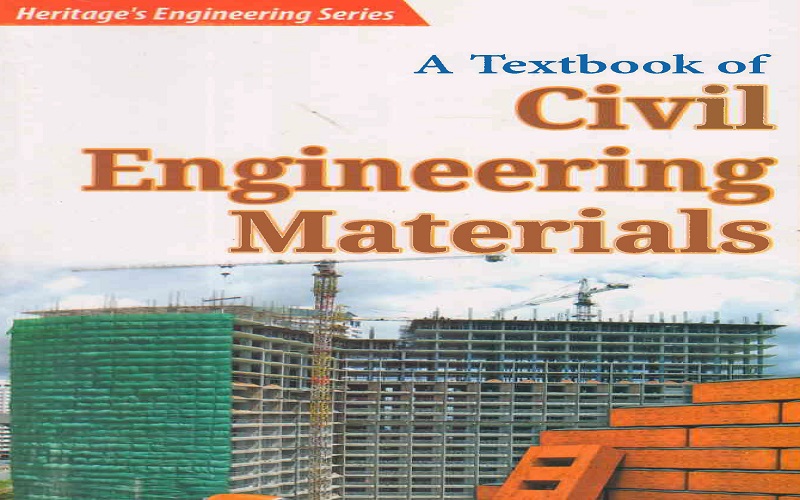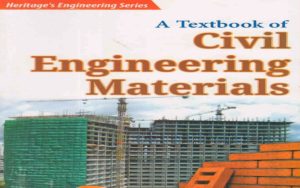Civil Engineering Materials PDF & eBook

All about materials to use in a comprehensive way for saving the amount of them in Civil engineering pdf. Civil engineering materials book help you to find the strongest material such as steel and timber are mostly used and known as one of the most powerful materials for better construction.
Basic civil engineering materials pdf covers some useful materials and details for giving a perfect look to your projects. The needs of every student are tools, types of equipment, and material stuff that also help to investigate Portland bond concrete.
The science and technology of civil engineering materials pdf takes a big lead in the different subjects in this firm due to having difficult topics and physical conditions. The material you will find in this book gets advanced modifications that help to study the structural building to comprehend the physical and auxiliary properties of regular development materials.
A great explanation of the use of timber and steel with minor reference to other propelled materials will be found in the civil engineering materials book download file in any format. You can read this book with high-quality fonts and textures on our website.

To a structural specialist, the execution of materials in structures and their capacity to oppose different burdens are of prime significance. This lab test work is planned to help understudies in structural building to comprehend the physical and auxiliary properties of regular development materials.
This includes the investigation of Portland bond concrete and solid influencing materials (to bond, totals, and so forth.), black-top solid, steel, and timber, with minor reference to other propelled materials.
Civil Engineering Material Features:
- This book was about all the modern materials which make a good construction.
- This book refers to High-quality material.
- From this, you can get unlimited information about all materials.
- In the field of civil engineering, Some modern materials are used such as Steel, Timber, Asphalt, and Portland Cement Concrete.
- All the material in this book is often used in many constructions.
Table of Contents:
- Chapter 1 – Units
- Chapter 2 – Strength of materials
- Chapter 3 – Failure of real construction materials
- Chapter 4 – Thermal properties
- Chapter 5 – Pressure
- Chapter 6 – Electrical properties
- Chapter 7 – Chemistry of construction materials
- Chapter 8 – Properties of fluids in solids
- Chapter 9 – Transport of fluids in solids
- Chapter 10 – Transport of ions in fluids
- Chapter 11 – Ionising radiation
- Chapter 12 – Variability and statistics
- Chapter 13 – Use of test results
- Chapter 14 – Specifications and standards
- Chapter 15 – Reporting results
- Chapter 16 – Testing construction materials
- Chapter 17 – Introduction to cement and concrete
- Chapter 18 – Cement and cement replacement materials
- Chapter 19 – Aggregates for concrete and mortar
- Chapter 20 – Hydration of cement
- Chapter 21 – Concrete mix design
- Chapter 22 – Testing wet and hardened concrete
- Chapter 23 – Creep, shrinkage, and cracking of the concrete
- Chapter 24 – Admixtures for concrete
- Chapter 25 – Durability of concrete structures
- Chapter 26 – Production of durable concrete
- Chapter 27 – Assessment of concrete structures
- Chapter 28 – Mortars and grouts
- Chapter 29 – Special concretes
- Chapter 30 – Steel
- Chapter 31 – Corrosion
- Chapter 32 – Alloys and nonferrous metals chapter 33 – Timber
- Chapter 34 – Masonry
- Chapter 35 – Plastics
- Chapter 36 – Glass
- Chapter 37 – Bituminous materials
- Chapter 38 – Composites
- Chapter 39 – Adhesives and sealants
- Chapter 40 – Comparison of different materials
- Chapter 41 – New technologies
About the Author:
Peter A. Claisse Editor-in-Chief, MethodsX. Professor Peter Claisse graduated with a degree in Physics from Oxford University and then spent the next 9 years working as a Civil Engineer on major UK construction sites.
Civil Engineering Materials PDF Download:
This book was written by Peter A. Claisse about the material which needs in civil engineering Such as Steel and timber. The new modern technology of civil engineering deals with construction materials as well as advanced materials.
Present-day materials, for example, polymers and composites are making progress in the development business. Huge research on these materials has prompted better comprehension of these materials and enhanced their quality and strength execution.
The customary materials utilized today are far better than those of the past, and new materials are by and large extraordinarily created to fulfill the requirements of structural designing applications. Download this book right now from our site: Civil engineering PDF